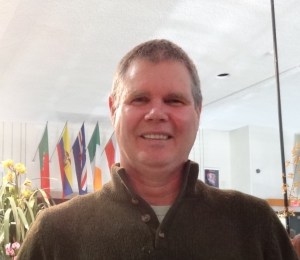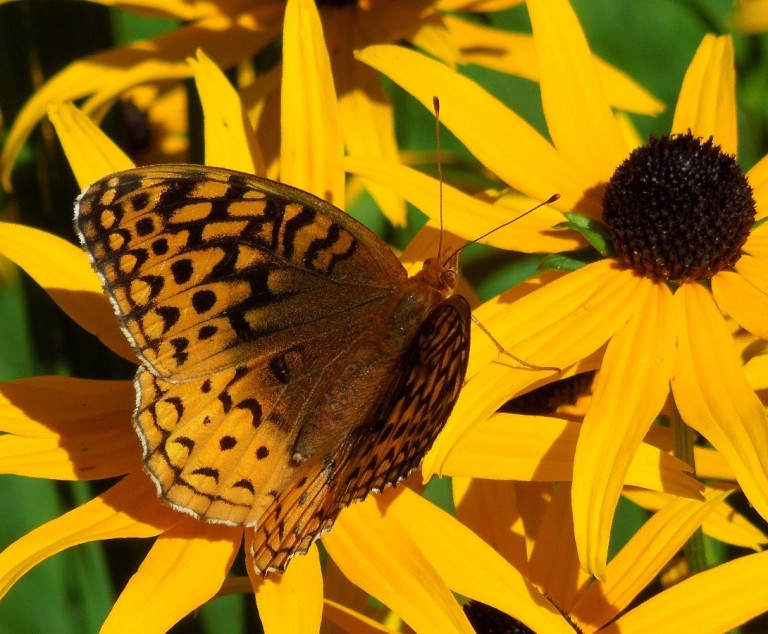
Bill Benner, veterinarian, birder, and butterfly gardener, is a man with many strings to his bow, but they all play tunes of the natural world and its fragility. He will be talking about the natural world, climate change and the impact it has on our own part of Massachusetts at GreenfieldCommunity College’s Senior Symposium on Tuesday, March 10 from 2-4 pm.
As a young man Benner attended CornellUniversity because of their ornithology lab. “I just wanted to study birds,” he said. As part of his research he was working with a captive flock of birds that required occasional help from a veterinarian. As he was drawing close to finishing his Master’s degree in Ecology and Evolutionary Biology with the idea of going on to earn a PhD he realized that he was not looking forward to a purely academic career. His consulting veterinarian suggested that he could take his love of birds and turn it into a veterinary career.
And so he has become a vet with a practice in South Hadley, a practice that includes birds and other ‘exotics,’ like rabbits, snakes and rodents. However, his interest in the broader aspects of the natural world has not been diminished, but rather has grown. As well as meeting animals in his practice, he goes out into the local wildernesses. When he moved to our area in the mid-1990s he became interested in butterflies and served for a time as president of the Massachusetts Butterfly Club. He is the current editor of the journal Massachusetts Butterflies, and an active member of the Hampshire Bird Club.

Benner was clearly the man to give me advice about making a butterfly garden. I have the same problem identifying butterflies as I do with identifying birds – my eyes are just not fast enough to discern detail of beak, or patterns on wings. However, I want butterflies in my garden so I am delighted to watch them visiting the herbs right in front of the house and think that I (probably) have some fritillaries or pearl crescents.
Benner explained that a butterfly garden needs more than nectar plants to attract butterflies. It is essential to supply host plants. Host plants are the plants where butterflies lay their eggs, and which will be eaten by the larvae, caterpillars, when they hatch. I have often sacrificed my dill plants in order to feed the caterpillars that will one day become black swallowtails. The much larger herb, fennel or sweet anise, will also attract swallowtails. The tiger swallowtail is partial to wild cherry, but lilacs, and ash and willow trees are also host plants.
Each kind of butterfly will require certain host plants, although there certainly is overlap. The same nectar plants will feed many more types of butterfly. Zinnias are an excellent nectar plant, but it is important to choose single or double varieties so the butterflies can see just where to land and dip in their proboscis or feeding tube.

Other nectar plants that will feed a number of butterflies include lilacs, butterfly bush, milkweed, coneflowers, asters, Joe Pye Weed, phlox, goldenrod, and mint. In the days when huge clouds of monarchs used to visit us in late summer I didn’t know they were attracted by the huge stand of mint in our field. The mint, important nectar plant, is still there but the monarchs no longer come. The world has changed.
Like many others I have given up pulling out milkweed in my cultivated gardens, and help the seeds fly down into my field, hoping to supply hosts for the monarchs. Benner recommended I not do this anymore. He said the common milkweed is very invasive, and is not of great benefit. Instead he recommends butterfly weed, Asclepias tuberose, with its big orange flower heads, and swamp milkweed, Asclepias incarnate with its lavender/purple flower heads. These are certainly additions to the garden, not weeds that we wish we didn’t have to ignore in order to support our local food web.
The Massachusetts Butterfly Club website has more information about gardening for butterflies including an article that Benner wrote for their newsletter. There he points out that there can be a danger in buying seedlings from the big box stores because they come from huge propagators who use systemic insecticides, neonicotinoids, that persist in the plant for weeks, or even the whole season. When the butterfly sips from these plants they will die. The big box store may never know about this and so can never guarantee that the plants are insecticide free.
And that brings us to the general advice not to use pesticides or herbicides in your garden if you want to attract wildlife. Let the edges go a little wild. Don’t mow the lawn too often. Violets are a host plant for fritillaries. It is hard to imagine that the small violets in my lawn could be hiding fritillary eggs or caterpillars.
Bill Benner will speak on Climate Change in our Own Backyards at the Greenfield Community College Downtown Campus on Tuesday, March 10 from 2-4 pm.

While Benner speaks about butterflies and summer days we can also visit the greenhouses at Smith College and Mount Holyoke College. It is time for their Spring Flower Shows both of which will be held from March 7-22 between 10am – 4 pm. Old Man Winter is keeping a firm grip on the landscape this year, but Lyman Plant House at Smith and Talcott Greenhouse at Mount Holyoke are calling his bluff.
Between the Rows